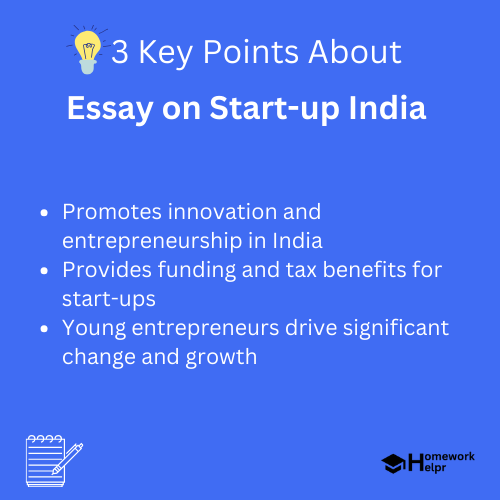📝 Summary
Start-up India is a major initiative by the Government of India launched on January 16, 2016, to foster entrepreneurship and innovation. It aims to create a supportive environment for new businesses, encouraging young minds to become job creators. Key objectives include fostering innovation, creating jobs, and simplifying regulatory processes. While benefits such as financial assistance and tax exemptions exist, challenges like competition and funding issues remain. Despite these, the potential for young entrepreneurs is significant, making India a leading start-up ecosystem globally.}
Essay on Start-up India for Students and Children
The term “Start-up India” refers to a significant initiative by the Government of India aimed at promoting new enterprises and fostering innovation in the country. It provides a robust framework to give new entrepreneurs the support they need to turn their ideas into viable businesses. The mission of Start-up India is to create a conducive environment for the growth of start-ups in India, helping them transition from mere ideas to impactful products and services. In this essay, we will explore various dimensions of the Start-up India initiative, its benefits, challenges, and the role of young entrepreneurs.
What is Start-up India?
Start-up India was launched on January 16, 2016, by Prime Minister Narendra Modi as a part of the government’s wider initiative to boost entrepreneurship in the country. The program is not only a movement but a commitment to support start-ups through policies aimed at fostering innovation, facilitating ease of doing business, and providing financial support. Start-up India encourages young minds to take risks and become job creators rather than just job seekers.
Definition
Entrepreneurship: The process of designing, launching, and running a new business, typically a start-up offering a product, service, or process. Innovation: The introduction of something new, such as a new idea, method, or device, leading to significant advancements or changes.
Key Objectives of Start-up India
Start-up India has several key objectives that aim to make India one of the world’s largest start-up ecosystems. Some of these objectives include:
- Fostering Innovation: Encourage innovation in technology and services.
- Creating Jobs: Facilitate job creation through entrepreneurship.
- Funding Opportunities: Provide access to funds through government programs.
- Reduced Compliance Burden: Simplify regulatory requirements for start-ups.
Benefits of Start-up India
The Start-up India initiative comes with a plethora of benefits that can help young entrepreneurs thrive in a competitive landscape. Here are some key advantages:
- Financial Assistance: Start-ups can access various funding schemes, including the Fund of Funds for Start-ups (FFS).
- Tax Exemptions: Tax holidays for start-ups, which can significantly reduce financial burdens.
- Networking Opportunities: Access to incubators, accelerators, and mentorship programs.
- Single Window Clearance: Simplified registration process through government portals.

Challenges Faced by Start-ups
Despite the many benefits, start-ups in India still face numerous challenges that can impede their growth. Some of these challenges include:
- Competition: The growing number of start-ups leads to fierce competition in the market.
- Funding Issues: Many start-ups struggle to secure adequate funding, especially in the initial stages.
- Regulatory Hurdles: Complex legal and compliance requirements can discourage aspiring entrepreneurs.
- Market Risk: Entering a new market comes with risks, especially if consumer demand is uncertain.
❓Did You Know?
India is among the top three start-up ecosystems in the world, only behind the USA and China!
Role of Young Entrepreneurs
Younger generations play a crucial role in the Start-up India movement. With their innovative ideas and familiarity with technology, they have the potential to drive significant change in various sectors. Young entrepreneurs can apply their knowledge to develop solutions that address pressing social issues, enhance productivity, and improve the quality of life.
Examples
An example of a successful young entrepreneur is Kunal Shah, the founder of the digital payments platform CRED, who identified the need for better credit solutions for customers and has revolutionized the financial sector.
Success Stories of Start-ups in India
Many start-ups have emerged as success stories under the Start-up India initiative. Some notable examples include:
- Zomato: An online food delivery platform that has transformed the way people order food.
- Ola: A ride-sharing company that has changed public transportation.
- Byju’s: An education technology company offering online learning solutions.
Examples
For instance, Flipkart is a prime example of a start-up that started small and grew into one of India’s largest e-commerce platforms through innovative strategies and hard work.
The Future of Start-ups in India
The future of start-ups in India looks incredibly promising. With the government continuing to support entrepreneurship through favorable policies, the potential for innovation is vast. Moreover, the shift towards digitalization, particularly in the current global scenario, opens up numerous avenues for new ventures.
As more young people embrace entrepreneurship, we can anticipate a wave of creativity and strategic thinking. This wave will not only foster economic growth but will also contribute to making India a global leader in technology and innovation.
Conclusion
In conclusion, the Start-up India initiative is a transformative movement that promotes the spirit of entrepreneurship among young individuals. By providing a supportive framework, it encourages innovation and job creation while helping overcome significant barriers. Although challenges remain, the resilience and creativity of young entrepreneurs have the potential to propel India to new heights in the global start-up ecosystem. The future is bright, and with continued support from the government and society, young people can truly become game-changers in the world of business!
Related Questions on Essay on Start-up India for Students and Children
What is the purpose of Start-up India”?
Answer: “To promote new enterprises and innovation in India.
Who launched Start-up India?
Answer: “Prime Minister Narendra Modi on January 16, 2016.
What are some benefits for start-ups?
Answer: “Financial assistance, tax exemptions, and networking opportunities.
What challenges do start-ups face in India?
Answer: “Competition, funding issues, and regulatory hurdles.
